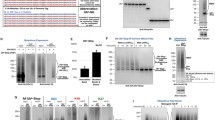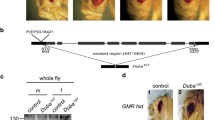Abstract.
The ability to destroy a particular protein at a particular time is central to the regulation of many cellular processes. Selective proteolysis in eukaryotic cells is carried out primarily by the ubiquitin-proteasome pathway. Attachment of a ubiquitin polymer to an unwanted protein causes it to be degraded by the proteasome. Several classes of enzyme, known as E1s, E2s and E3s, control the stepwise formation of a ubiquitin-protein conjugate. The specificity of substrate selection lies with the E2s and E3s. Here we describe the cloning of a Drosophila E2 gene, UbcD4, which is only expressed in embryos. Its expression pattern in stage 10–11 embryos suggests a role in germ cell development. UbcD4 can interact with the polyubiquitin-binding subunit of the proteasome.
Similar content being viewed by others
Author information
Authors and Affiliations
Additional information
Electronic Publication
Rights and permissions
About this article
Cite this article
Canning, .M., Kirby, .R. & Finnegan, .D. UbcD4, a ubiquitin-conjugating enzyme in Drosophila melanogaster expressed in pole cells. Mol Gen Genomics 266, 907–913 (2002). https://doi.org/10.1007/s00438-001-0623-8
Received:
Accepted:
Issue Date:
DOI: https://doi.org/10.1007/s00438-001-0623-8




